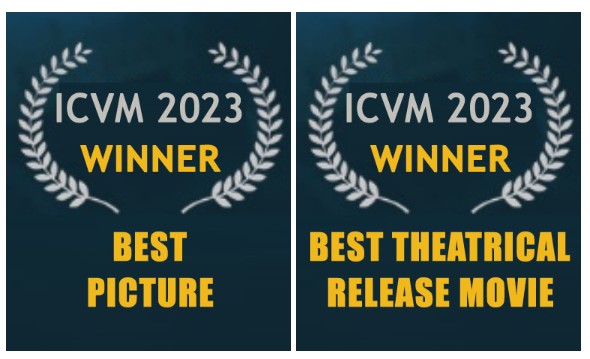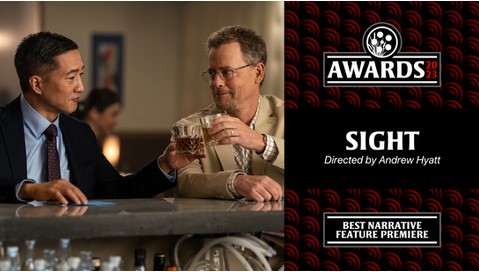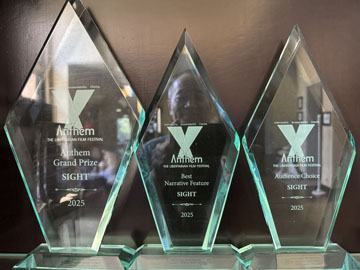MOVIE REVIEW
When Jesus cured the blind man in John 9, all He needed was a little mud.
Dr. Ming Wang requires more.
Oh, sure, some might say that Ming is a miracle worker in his own right. But the good doctor knows that curing someone’s sight takes more than mud. It takes knowledge. It takes skill. And Ming (he might say with all due modesty) has plenty of both. You’d expect nothing less from the country’s best eye surgeon.
That knowledge and those skills didn’t come through any sort of miraculous intervention, either—at least not in Ming’s thinking. He earned both. Boy, did he earn them.
Ming grew up in China during its brutal Cultural Revolution, when activists shut down schools, tried to sweep away millennia of history and repaint Chinese society in red. It’s hard to learn medicine when no one will teach you. It’s hard to become a healer when the country’s powers would rather turn you into a killer.
Ming’s journey to Harvard, MIT and, ultimately, Tennessee contained plenty of twists and turns, dips and dead ends. But after decades of work and study and sacrifice, he made good on his promise to his parents and himself. He became a doctor, the sort of doctor that people from all over the world ask—sometimes beg—for help. And when the surgery is successful (as it so often is), he poses with his grateful patients as the cameras flash and the people applaud.
But Ming knows that even he has his limits.
Take Kajal, a young girl from the slums of Calcutta. Those who are blind there make better beggars, we learn. So Kajal’s stepmother intentionally poured sulfuric acid into the girl’s eyes.
But Kajal’s life took a turn for the better. Now in the care of kindly Sister Marie, she’s in the U.S. to see if Dr. Wang just might be able to find what she lost: Perhaps he can help this little blind girl see again.
Ming takes a look at Kajal’s eyes and doesn’t see a lot of hope for her. Might Ming do something? Perhaps. But it’s a small chance. And if the surgery fails, there will be no applause.
But something about the girl reminds him of another he used to know, long, long ago. Ming’s touched by her story. And even though he tells Sister Marie how slim the chances are for success, Marie reminds him how much Kajal has already been through.
“She has traveled across the world for a chance,” Marie says. “Even a slim chance.”
Ming works miracles, some say. But he’ll need more than mud to bring sight to this little girl. He’ll need all his knowledge, all his skill—and even then, it might not be enough.
POSITIVE ELEMENTS
Based on the true story of Dr. Ming Yang and his revolutionary work, Sight splits the narrative between following Ming on his way to becoming a doctor (both in China and stateside) and his work as a doctor in Tennessee—particularly his work with Kajal. He’s an easy guy to root for on both timelines.
As a boy and a young man, Ming works furiously to make good on his own and his family’s ambitions for him. Faced with tremendous obstacles, Ming somehow manages to find a way over or around or through. When he does become a doctor, he obviously cares for his patients (as most doctors do).
But he seems to feel particularly responsible for Kajal, working some incredibly long hours to try to return the girl’s sight. After the surgery, we learn that Ming started his own charitable foundation to restore sight to the world’s most needy, free of charge. (The film tells us his foundation has helped people from more than 40 states and 55 countries.)
But as admirable and as laudable as Ming’s story might be, I was struck by the people who came alongside him, led him forward and, sometimes, nudged him back on the right track.
Obviously, Ming’s parents played a huge role in Ming’s life, serving as strong, brave role models as Ming grows to maturity. When the Cultural Revolution unleashes its horrors on Chinese society, Ming’s mom and dad bravely push on. His father, a doctor himself, instills in Ming a love of his native China, too, pushing back against the Revolution’s aims of sweeping away the country’s past. “They don’t understand the reason why China is great [is] because of the tradition, because the people here believe in honor and sacrifice,” he tells young Ming.
They serve as strong role models for the grown Tennessee doctor, too. His mother, Alian, frets that her son just might drop from exhaustion. And his dad, Zhensheng, comes alongside Ming when the doctor might be at his lowest—reminding Ming of a beloved Chinese poet and encouraging him to move forward.
Dr. Misha Bartnovsky, Ming’s associate, serves Ming as his assistant, his friend and, at times, his conscience. When Ming worries that Kajal’s case is too difficult, Misha gently prods him to take it. When Ming spins through a crisis of confidence, Misha helps tether him. “We can only do our best,” he tells Ming. “It’s all we can do.”
When Ming arrives in the U.S. to begin his medical education, a college professor encourages Ming’s ambitions—telling him that he’s destined for great things.
And Kajal, too, inspires Ming. I’ll have more to say about that in the section below. But here, I’ll simply say this: While Ming did his best to save Kajal’s eyesight, the doctor was in need of a little healing, too—and Kajal was instrumental in helping his own healing process along.
SPIRITUAL ELEMENTS
The real Dr. Wang is a committed Christian. But Sight presents us with a portrait of Ming Wang who, through most of the film, really doesn’t express much religious interest at all.
Part of that may stem from the communist, atheistic society he was raised in. Religion was always looked down upon in the China ruled by Mao Zedong, and exponentially more so during the Cultural Revolution. One question does haunt Ming, though: “What happens when we die?” his longtime friend, Lili, asked him once. “Is it just darkness?” It’s an important question—so important that the movie itself opens with it.
The question is all the more haunting in that soon he and Lili would be separated—apparently forever. But then, about the time that Kajal arrives at his clinic, Ming starts seeing Lili again—walking the halls or staring at him from across a room. Ming wonders whether he’s seeing ghosts or going mad.
Ming is very interested in clearing away the physical darkness caused by blindness when he can. But it takes some time for him to realize that the greater darkness is spiritual. Kajal, his small patient, may be blind, but her spiritual sight surpasses that of Ming. Before surgery, she expresses her gratitude not only to her doctors, but “to God.” Afterward, she gives him the gift of a Catholic rosary—one that Ming thoughtfully toys with. “I’ll be praying for you,” she tells him.
And Sister Marie tells Ming that Kajal is, blind or not, a miracle herself: “Look what God uses when we refuse to believe there is no purpose,” Sister Marie says.
Sister Marie expresses her own hope in God as well. And during Kajal’s surgery, we see her praying in the hospital chapel. She tells Ming that Kajal, in spite of her own difficulties, facilitates prayers for others, “asking God to give them strength through their difficulties.”
Ming looks at a nearby cross toward the end of the movie—another indication, it would seem, that he’s moving toward faith. One of Ming’s patients was brought to his office by an American couple, who met the patient while on a mission trip.
CONCLUSION
Sight, the movie’s title, comes with a double meaning. Yes, it’s about Dr. Ming Wang’s work restoring sight to the blind. But it reminds us that the most crippling blindness isn’t that of the eyes, but of the heart.
Yes, Kajal comes into the movie blind. But Sight suggests that, in some ways, she sees better than the driven, publicity-minded Dr. Wang. She sees the love of God. She sees the everyday miracles. She sees the needs of people around her in ways that Ming can’t—or won’t—take the time to see.
Sight does this without diminishing the important, near-miraculous work that Ming does (and that the real Dr. Wang continues to do). But it reminds us that sometimes, when we keep our eyes focused on the Hollywood happy ending, we lose sight—truly—of the underlying, saving truth: God is with us. God loves us. And even when heartbreak happens, when tragedy visits, when we suffer unimaginable difficulties, God can redeem it all.
God loves His twists. He likes taking our expectations and flipping them on their heads, creating a beauty and power we’d never expect.
In the film, a young Ming Wang learns to play an instrument called the erhu, a sort of two-stringed fiddle. He learns from Lili’s blind father that one of his favorite erhu pieces, “Two Springs Reflect the Moon,” was written by a blind composer—one who had never seen a spring, or a reflection, or a moon. The composer, Ah Bing, had to imagine it all, and in so doing brought beauty and meaning to the image that a sighted composer could never have equaled.
“It’s because of this I have hope to hang on to,” the old man says. “Ah Bing imagined beauty even though he could not see.”
Those who go to see Sight will see some difficult, violent images. But they’ll also be witness to a powerful story. In a film titled Sight, the physical meaning of the title becomes almost an afterthought. Instead, we may be reminded of another great composition:
I once was lost, but now am found
Was blind, but now I see.





